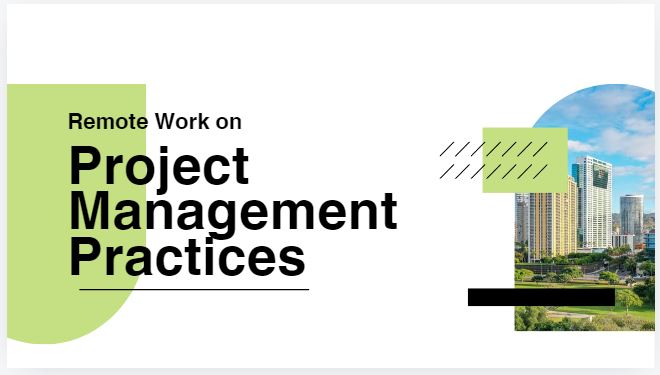
The widespread adoption of remote work has reshaped various aspects of business operations, especially project management. With teams dispersed across multiple locations, project managers are now tasked with navigating new challenges, rethinking traditional methods, and implementing innovative strategies to ensure success. This shift has created a demand for specialized knowledge and skills, which can be acquired through advanced education such as executive project management courses or the best post-graduate diploma in project management.
In this blog, we’ll explore how remote work has impacted project management practices, what adjustments are needed, and why enrolling in project management professional certification is essential to thriving in today’s digital workspace.
The Rise of Remote Work
Remote work has become a permanent fixture in the business world, fueled by advancements in communication technology and a growing acceptance of flexible working models. While this shift offers numerous benefits, such as reduced overhead costs and access to a global talent pool, it also brings new complexities to managing projects.
Project managers must now address communication challenges, maintain team cohesion, and ensure accountability, all while operating in a virtual environment. Mastering these challenges requires enhanced project management skills, which can be developed through the best PG diploma in project management degree programs.
Key Challenges in Remote Project Management
Remote work brings with it several challenges that project managers must overcome:
- Communication Gaps: Virtual communication can often lead to misunderstandings. Without face-to-face interactions, project managers need to employ more structured and frequent communication practices.
- Collaboration and Team Dynamics: Building and maintaining a cohesive team culture in a remote setup is difficult. Lack of in-person collaboration can result in a disconnect between team members.
- Time Zone Management: Teams are often spread across different time zones, making it challenging to synchronize meetings and project deadlines.
- Project Monitoring and Accountability: Tracking progress and ensuring that everyone is aligned with project goals becomes more complex in a remote environment. It requires a shift towards digital project management tools and greater emphasis on self-discipline among team members.
How Remote Work is Changing Project Management Practices
Despite these challenges, remote work has brought about several changes that are transforming project management practices for the better:
- Adoption of Digital Tools: Project management software like Trello, Asana, and Microsoft Teams have become essential for tracking progress, assigning tasks, and fostering collaboration among remote teams.
- Flexible Work Schedules: With remote work, project managers can offer flexibility to team members in terms of work hours, which can increase productivity and job satisfaction.
- More Strategic Planning: Remote work necessitates thorough project planning and documentation, as project managers need to anticipate potential roadblocks, mitigate risks, and outline clear workflows in advance.
- Enhanced Global Collaboration: Remote work enables project managers to work with diverse teams across the globe, benefiting from different perspectives and expertise.
To excel in this new environment, project managers need specialized training and up-to-date knowledge. Enrolling in executive project management courses and top post-graduate diploma in project management programs is an excellent way to prepare for these challenges.
The Importance of Advanced Project Management Education
With remote work becoming more common, professionals must upskill to manage projects effectively in this new landscape. Pursuing the best post-graduate diploma in project management equips project managers with tools, techniques, and strategies to overcome remote work challenges.
Here’s how specialized courses can help:
- Advanced Communication Techniques: Learn how to maintain open, transparent, and effective communication across virtual teams.
- Leadership in a Digital Era: Develop the leadership skills required to motivate, engage, and guide remote teams to success.
- Use of Collaboration Tools: Gain hands-on experience with the latest project management software and tools to keep remote teams organized and focused.
- Global Project Management: Learn to manage culturally diverse teams, bridging gaps in communication and expectations to ensure smooth project execution.
For experienced professionals, executive project management courses offer more advanced insights into strategic planning, risk management, and high-level leadership in remote environments.
Choosing the Right Project Management Course
With the growing complexity of managing remote teams, it’s important to choose a program that aligns with your career goals and provides the skills you need. Whether you are an aspiring project manager or a seasoned professional looking to update your skills, there are several top-rated programs available:
- Top PGDM Project Management Courses: These programs offer an in-depth understanding of project management principles while addressing the unique challenges posed by remote work. They are ideal for professionals looking to fast-track their careers in project management.
- Best PG Diploma in Project Management: This course is designed for those who wish to build a solid foundation in project management, covering essential topics like risk management, time management, and the use of digital tools in remote work environments.
- Top Post Graduate Diploma in Project Management: An advanced program for professionals looking to specialize in managing large-scale projects remotely. It focuses on strategic planning, agile methodologies, and remote leadership techniques.
By choosing the right educational path, professionals can position themselves for success in the evolving world of project management. The skills learned from these programs not only make managing remote teams more efficient but also help project managers stand out in a competitive job market.
Enroll in MITSDE for PGDM in Project Management
For professionals looking to excel in this new remote-first world of project management, enrolling in the PGDM Project Management course at MIT School of Distance Education (MITSDE) is an excellent option. MITSDE offers a comprehensive curriculum tailored to meet the needs of today’s evolving work environments, focusing on key skills like remote team management, digital collaboration, and strategic planning. As one of the best PGDM courses, MITSDE’s program equips students with the practical knowledge and cutting-edge tools needed to succeed in any industry. Whether you’re managing remote teams or handling complex, multi-location projects, MITSDE’s PGDM course will give you the competitive edge to thrive in modern project management.
Conclusion
Remote work is not just a trend—it’s a shift that has fundamentally altered the way businesses operate, especially when it comes to project management. Project managers must now be more agile, technologically adept, and capable of leading diverse, distributed teams. To meet these demands, it’s crucial to invest in the right education, such as executive project management courses or the best PG diploma in project management, which provide the knowledge and tools needed to thrive in this new era.
By enrolling in best project management certification online or obtaining a project management professional course can master the complexities of remote work and lead their teams to success. In the end, remote work is not a barrier but an opportunity for innovation, growth, and success in project management.


